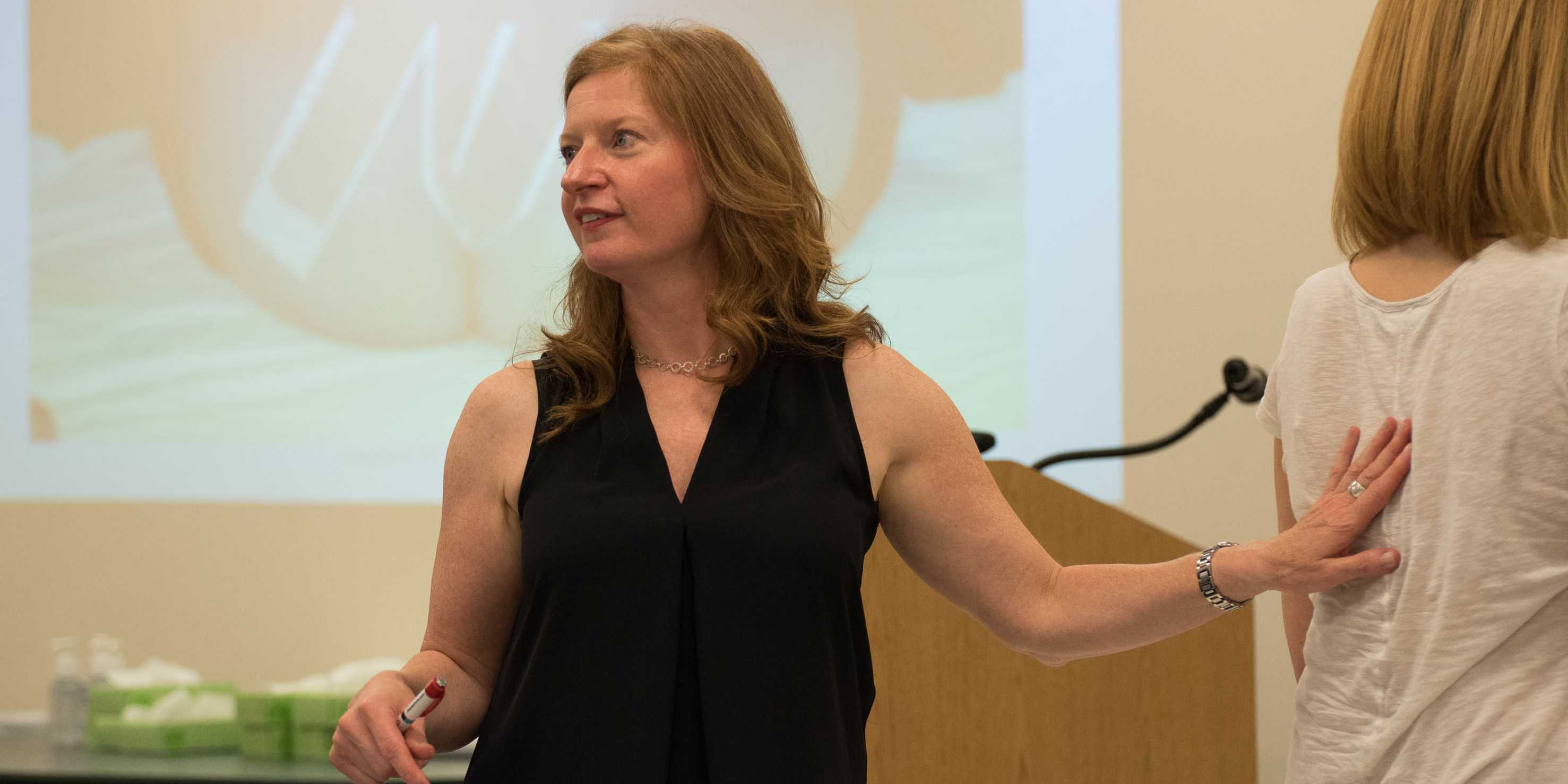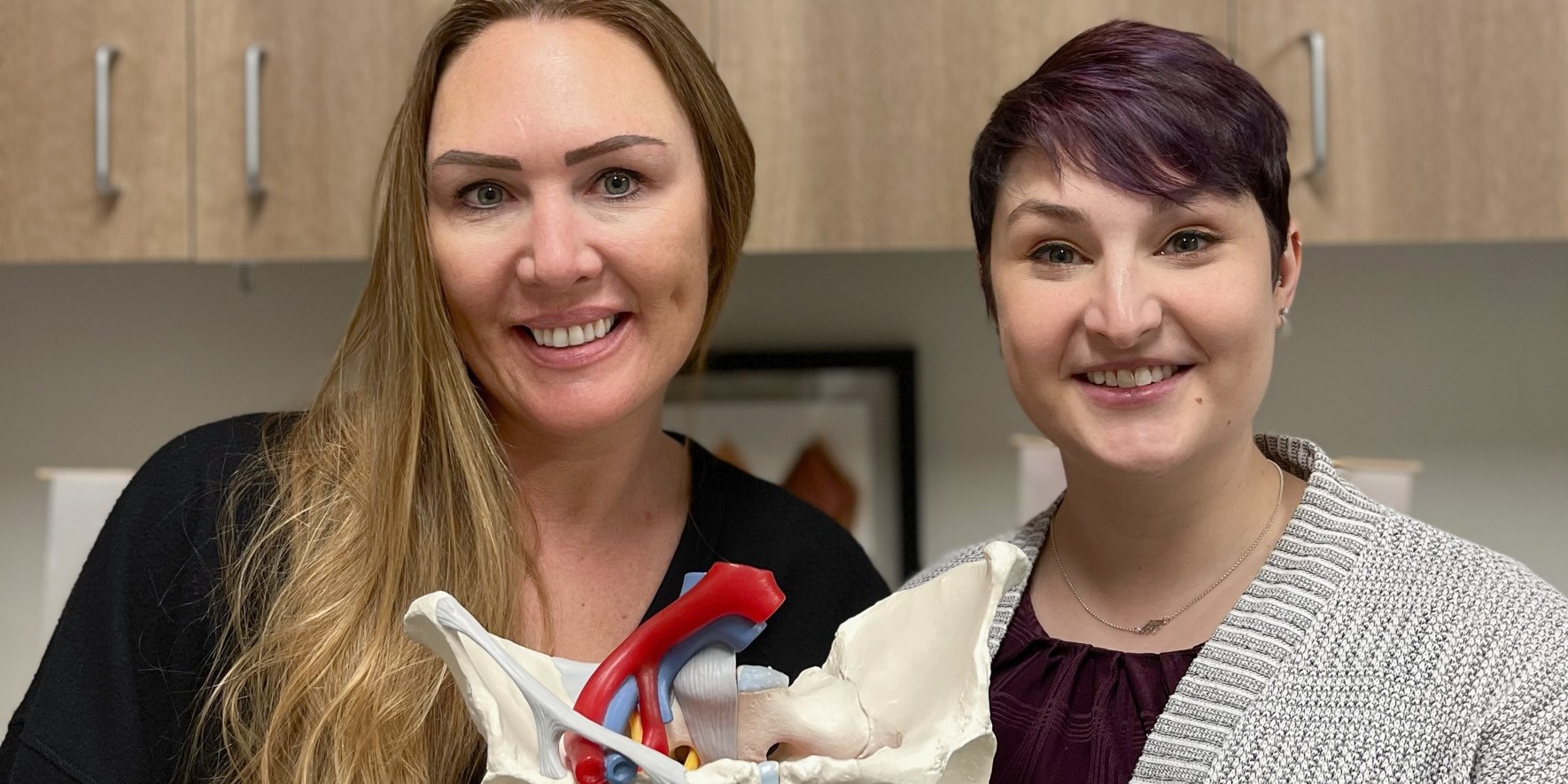Jason Hardage is a physical therapist who practices in Alameda, CA. He recently attended the Mindfulness-Based Pain Treatment course which is written and instructed by faculty member Carolyn McManus, PT, MS, MA. Dr. Hardage was kind enough to send in the following review in order to help spread the good word about this powerful course. Your next opportunity to learn how to apply mindfulness practices in your clinic will be in Boston, MA on March 4-5, 2017.
Carolyn McManus' 2-day course, Mindfulness-Based Pain Treatment, was truly outstanding. In my opinion, the integration of mindfulness into healthcare is a paradigm shift and in that sense Carolyn is a visionary who is ahead of her time, as she has been practicing in this arena for many years. Her expertise is clear (as is her joy in teaching).
In this course, she introduces the basic terminology, concepts, and mindfulness practices in a way that is experiential, practical, and accessible, with many tools and techniques to integrate into clinical practice. She thoroughly reviews the evidence in a way that is skillful and compelling and provides the theory as to how mindfulness works, then provides case studies from her own clinical practice. She also provides a brief survey of other tools and approaches that are complementary, such as yoga, loving kindness meditation, and motivational interviewing, then shows how to put it all together, including suggestions for documentation and billing. She is generous in sharing resources, including patient education materials and four open-access guided relaxation and meditation sessions from her Web site, as well as resources for continued study. Furthermore, she presents ways for the healthcare practitioner to use mindfulness for self care, to help combat the burnout that can come with serving those with complex needs in a demanding healthcare environment.
On November 15th, 2016 a new class of Pelvic Rehabilitation Practitioner Certification was crowned! Today we get to celebrate with Andrea Wood, PT, DPT, PRPC from New York. Andrea was kind enough to share some of her thoughts on pelvic rehabilitation and what certification means to her. Thank you Andrea, and congratulations on earning your PRPC credential!
Describe your clinical practice:
I work in an orthopedic clinical practice that has one on one care which I think is valuable. I joined my practice to help offer another view that included pelvic floor knowledge to various patient cases. My coworkers and I collaborate a lot because we both may see things differently, and exchanging ideas is always invaluable for optimal patient outcomes. I really believe the best health care practitioners can admit when they don’t know everything and seek out other viewpoints to learn.
How did you get involved in the pelvic rehabilitation field?
I actually had no idea I originally wanted to do pelvic floor rehab. I was lucky to fall into it right out of graduate school up in Boston at a wonderful place called Marathon Physical Therapy. I found it fascinating how important it was to consider in a lot of patients, especially those presenting with hip, back, or pelvic pain. Two years into working, I found out I had mild congenital hip dysplasia in my left hip and underwent a periacetabular osteotomy to correct it. Going through the rehab on the other side as a patient and having to experience what it means to practice a lot of the principles I teach patients made me excited to continue to help people overcome obstacles. I’m a better physical therapist now because of my personal history. It taught me to always give patients the means to keep moving within their means and not provide only passive treatments. My two physical therapists that helped me through that became my biggest role models on how to approach complicated patient problems.
What patient population do you find most rewarding in treating and why?
I find it most rewarding to work with pelvic pain patients. I like to think of them as a puzzle. With those patients, I’m an orthopedic physical therapist first, because of how much influence other parts of the body can have on the pelvis. I also am a big advocate of collaborative health care with those patients, and when you bring a team of different views together (i.e. medical doctor, physical therapy, nutritionist, and psychologist to name a few) I find I learn something new each time.
If you could get a message out to physical therapists about pelvic rehabilitation what would it be?
It is not just about 3 layers of muscles in your pelvic floor and Kegels. Your pelvis is a center of your body with various biomechanical, vascular, and neurological influences. For example, erectile dysfunction in males can be influenced by pelvic floor muscle dysfunction, cardiovascular health, and psychological or neurological conditions. A woman with painful intercourse could have various contributing factors ranging from a back or hip problem to a dermatological skin issue. I think physical therapists not properly educated on pelvic floor rehab oversimplify it unknowingly.
What has been your favorite Herman & Wallace Course and why?
My favorite Herman & Wallace course was the Pudendal Neuralgia and Nerve Entrapment. That course opened my eyes up to pain science and how much we really don’t know about pain as a medical community.
What lesson have you learned from a Herman & Wallace instructor that has stayed with you?
That the amount of pain a patient may have does not always signify the amount of damage that is present. When patients realize this, they feel a lot more hopeful and in control.
What do you find is the most useful resource for your practice?
I love learning from other physical therapy blogs. Blog About Pelvic Pain by Sara Saunder and Julie Weibe’s blogs are two of my favorites to follow. I lend the book Pelvic Pain Explained to a lot of my patients.
What motivated you to earn PRPC?
I like to challenge myself, and I felt it was a good test to access areas I need improvement in and should study more or seek out further continuing education.
What makes you the proudest to have earned PRPC?
I’m proud to have earned the PRPC because I earned something that I am passionate about. Some people don’t get that blessing.
What advice would you give to physical therapists interested in earning PRPC?
Just being passionate and asking a lot of questions about what I don’t know in clinical practice provided me with best tools to prepare for the exam.
What is in store for you in the future?
Continuing to learn as much as I can. I plan on seeking out some continuing education in areas of physical therapy like neurology or cardiovascular issues that can all still influence the pelvic floor. I think its important to be a well rounded physical therapist.
The following comes from a male patient who wanted to share his story about finding care for his pelvic floor dysfunction. His story highlights the important role pelvic rehab practitioners can play, and why we need to continue training more therapists in this field.
I’m 65 year old male and I developed pudendal neuralgia and pelvic floor issues as a result of an accident about four years ago. Shortly after my accident I started to experience pain in my testicles and perineum. At the time, I did not think that one had anything to do with the other. I made an appointment with my urologist who did an ultrasound and assured me that there was nothing physically wrong. I don’t think my testicles quite believe that but mentally I felt relieved. But the pain persisted and started to spread. Now it was also in my groin and penis. I was also having problems with chronic constipation, urinary retention and erectile dysfunction. Since I did have back surgery years ago I started to suspect my low back was causing the problem. I made an appointment with a well-respected orthopedic surgeon in New York. While he gave me his analysis with regards to my back problems he clearly avoided addressing the pelvic issues. I left there feeling lost. Suffice it to say that over the course of the next couple of years I saw several other specialists who either skirted around the issue or told me that nothing was wrong. A couple of years passed but the pelvic issues just continued to get worse and worse. I started seeing a new primary care physician who indicated that perhaps the source of the pelvic pain was coming from the pudendal nerve and felt that physical therapy might help. She gave me a prescription for physical therapy to evaluate for pudendal nerve.
Well, I have a diagnosis now so I start researching pudendal neuralgia and land on the Pudendal Hope website. Wow! What an eye opener that was. I’m reading the information on the website and it was like I had an epiphany. I realized that I was not going crazy and that Pudendal Neuralgia and pelvic pain are very real issues.
The following testimonial comes to us from Karen Dys, PTA. Karen recently attended the Care of the Pregnant Patient course, and she was inspired to send in the following review. Thanks for your contribution, Karen!
I have been working as a physical therapist assistant for 11 years and worked in a variety of settings. In the past two year I have become more focused on pelvic floor rehabilitation. During that time frame I have had a handful of pregnancy patient including being a pregnant woman myself. Since taking this course, my mind has been opened up of how I can treat my patients and educate them for their best future outcomes. I also can see now how I would have benefited myself if I knew some of these techniques that I’ve now learned. With knowing with my personal story and that my PT could have helped me more with avoiding bed rest and staying active longer with pregnancy, it has become my goal now to treat my pregnant patients differently. I am thankful for Herman and Wallace courses to gain these wonderful techniques to reach out and help so many people.
Within the first few moments of meeting the teacher at a continue education class I can tell if is going to be a good class or not. This course started out great with a very friendly and kind person. Sarah’s compassion and knowledge brightly shined throughout the weekend of teaching. It was very refreshing having a teacher who also has experienced some of the same problems are patients go through. It gave it a good personal perspective of how we can affect our patient outcomes.
Nancy Cullinane PT, MHS, WCS is today's guest blogger. Nancy has been practicing pelvic rehabilitation since 1994 and she is eager to share her knowledge with the medical community at large. Thank you, Nancy, for contributing this excellent article!
Clinically valid research on the efficacy and safety of therapeutic exercise and activities for individuals with osteoporosis or vertebral fractures is scarce, posing barriers for health care providers and patients seeking to utilize exercise as a means to improve function or reduce fracture risk1,2. However, what evidence does exist strongly supports the use of exercise for the treatment of low Bone Mineral Density (BMD), thoracic kyphosis, and fall risk reduction, three themes that connect repeatedly in the body of literature addressing osteoporosis intervention.
Sinaki et al3 reported that osteoporotic women who participated in a prone back extensor strength exercise routine for 2 years experienced vertebral compression fracture at a 1% rate, while a control group experienced fracture rates of 4%. Back strength was significantly higher in the exercise group and at 10 years, the exercise group had lost 16% of their baseline strength, while the control group had lost 27%. In another study, Hongo correlated decreased back muscle strength with an increased thoracic kyphosis, which is associated with more fractures and less quality of life. Greater spine strength correlated to greater BMD4. Likewise, Mika reported that kyphosis deformity was more related to muscle weakness than to reduced BMD5. While strength is clearly a priority in choosing therapeutic exercise for this population, fall and fracture prevention is a critical component of treatment for them as well. Liu-Ambrose identified quadricep muscle weakness and balance deficit statistically more likely in an osteoporotic group versus non osteoporotics6. In a different study, Liu-Ambrose demonstrated exercise-induced reductions in fall risk that were maintained in older women following three different types of exercise over a six month timeframe. Fall risk was 43% lower in a resistance-exercise training group; 40% lower in a balance training exercise group, and 37% less in a general stretching exercise group7.
Today's blog is a contribution from Kristen Digwood, DPT, CLT, of the Elite Pelvic Rehab clinic in Wilkes-Barre, PA.
Urgency urinary incontinence (UUI), which is the involuntary loss of urine associated with urgency, is a common health problem in the female population. The effects of UUI result in limitations to daily activity and quality of life.
Current guidelines recommend conservative management as a first-line therapy in urinary incontinence, defined as "interventions that do not involve treatment with drugs or surgery targeted to the type of incontinence".
Danielle is among the latest class of Certified Pelvic Rehabilitation Practitioners! Her experience treating patients and owning Core 3 Physical Therapy prepared her to pass the exam in flying colors. Read her bio here and check out our interview below. Congratulations, Danielle!
What/who inspired you to become involved in pelvic rehabilitation?
A patient was the first one to inspire me to improve my knowledge and treatment abilities in pelvic rehabilitation. I was working with a postpartum patient, while carrying my first child, and she felt that my guidance had been so helpful in her care that it made me interested learning more about the pelvic floor. Most of my fellow colleagues could discuss my orthopedic questions but I didn’t have any mentors that could offer advice in more advanced pelvic floor cases so I started attending the Herman and Wallace classes. They have been an invaluable at improving my ability to care for patients with pelvic pain which has even improved my treatment of orthopedic patients with low back pain and sacroiliac dysfunction.
What patient population do you find most rewarding in treating and why?
I enjoy working with chronic pelvic pain patients because it's rewarding to be able to bring relief to someone who has been living with pain, limited quality of life or even social anxiety and has not received any benefit with other treatment options. Being able to help this patient population understand the pelvic floor muscles and function as well as providing justification to why they are in pain and then help them progress through various treatment approaches makes my job rewarding.
If you could get a message out to physical therapists about pelvic rehabilitation what would it be?
PT's are uniquely trained to provided internal pelvic floor muscle release. This is something that no other health care professional is licensed or has the schedule/time to perform. This technique can provide relief and feedback to your patients that is possible in no other way. If you do not want to address this region or feel comfortable providing this treatment, find a therapist local to you who has experience with pelvic floor and refer when appropriate. Additionally, we as physical therapists are often the first line of defense in recognizing and educating patients about the ability to address a wide variety of symptoms that they believe is "just a normal part of life". Asking the in-depth questions and providing a multimodal approach to their symptoms is not only a boon to the patient but to our profession.


More than a year ago, after working on updating the pelvic floor series courses PF1, 2A and 2B, the Institute turned our attention to the final course in our popular series, PF3. To determine what content our participants wanted to learn about in the last continuing education course of the series, we asked that exact question. From a large survey of therapists who had taken all or most of the courses in the pelvic core series, we collected detailed data from therapists about what was needed to round out their comprehensive training. The results of that survey guided hundreds (and hundreds!) of hours of work completed by a team of instructors. This month, in the beautiful city of Denver, the three instructors who created the Capstone course will share their wisdom, clinical experiences, as well as their thoughtfully-designed lectures and labs. You will have an opportunity to learn in depth about topics covered in the prior courses in the series.
Such topics include lifespan issues and health issues common to different ages, conditions of polycystic ovarian syndrome, endometriosis, infertility, pelvic organ prolapse and surgeries, pelvic fascial anatomy, pharmacology and nutrition. Lab components are detailed and comprehensive for working with specific common implications from conditions in pelvic dysfunction or surgery. This course focuses on the female pelvis, including diving into the complexities of female pelvic health issues. The instructors have all worked in the field for many years, are experienced in working with complex patient presentations, and all excel at manual therapies. I asked each of them to briefly share thoughts about the Capstone course that they each dedicated the last year in developing; following you can read their thoughts.
The American Society of Clinical Oncology convened their 2016 annual meeting over the weekend, and several of the presentations suggest new methods of preventing breast cancer recurrence.
Extended Hormone Therapy Reduces Recurrence of Breast Cancer
Breast cancer patients who are treated with aromatase inhibitor therapy are generally prescribed the the estrogen drugs for a five year course. A new study has suggested that by doubling the length of hormone therapy, the recurrence rate for breast cancer survivors drops by 34%. The study included 1,918 women who underwent five years of hormone therapy with the drug letrozole. After five years, half of the group switched to a placebo while the other half were given an additional five year treatment.
Congratulations to Jane Blair Johe, PT, PRPC on becoming one of the newest Certified Pelvic Rehabilitation Practitioners! Read our interview with Blair below.
Tell us about your clinical practice
I work in a free standing outpatient PT center of a large 4 hospital affiliation. 70% lymphedema 30% pelvic floor rehab.
How did you get involved in the pelvic rehabilitation field?
I was already the lymphedema PT (LANA cert.) when I moved to WV. The women's health PT was moving to another state and asked me to please pick up her bladder incontinence patients.








































